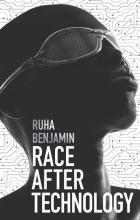CWRU's Common Reading selection for 2023-2024 is Ruha Benjamin's Race After Technology. The Writing Program offers the following resources for using this text in First Seminars and other writing courses.
Benjamin will speak at our Fall Convocation (Thursday, September 7, 2023, at 4:45 p.m.). Click here to reserve your complimentary tickets.
Fall Convocation is the formal opening of the academic year; it is an event that offers an opportunity to reflect on the history, symbols, and traditions of the university. First Seminar instructors might decide to attend as a class, or you might ask students to reflect on their experience and their expectations for college. We have found that a brief, written reflection can help faculty plan activities and assignments to support their student writers, and reflection is an important academic success skill for students.
Our Resources for Faculty page offers some general advice about working with student writers, and the Writing Resource Center consultants are ready to work with faculty, staff, and students on their writing projects this year.
Kelvin Smith Library has collected references and resources on the text. A reading and discussion guide is also available.
Related Events
The following events build on this year's reading. More programming is coordinated by First-Year Experience and Family Programs.
The CWRU Film Society is planning a series of films exploring technology, including:
- 9/12 - I-Robot
- 10/10 - The Mitchells vs. the Machine
- 11/14 - M3gan
- 12/5 - AI - Steven Spielberg
- 2/13 - Avengers: Age of Ultron
- 3/5 - Ex-Machina
- 4/9 - Freakonomics
Critical Conversation
The Problem with AI and Problem Solving: Ethics
Wednesday, Sept. 27, from 10:45-11:45 a.m.
Sears think[box] First Floor Auditorium
Richey Mixon Building 11201 Cedar Ave.
**Note: Recording of this event is not permitted.
Panelists:
- Timothy Beal, Distinguished University Professor and Florence Harkness Professor of Religion, College of Arts and Sciences
- Vipin Chaudhary, Kevin J. Kranzusch Professor and Chair, Computer & Data Sciences, Case School of Engineering
- Shannon French, Director and Inamori Professor in Ethics, Inamori International Center for Ethics and Excellence and Professor, College of Arts and Sciences and School of Law
Register Here: https://cglink.me/2cS/r2168303
Edward S. and Melinda Sadar Lecture in Writing in the Disciplines
A Lecture by Dr. Annette Vee (University of Pittsburgh)
Monday, December 11, 2023
3:15-4:30 p.m.
Tinkham Veale University Center, Senior Classroom
Generative AI platforms such as ChatGPT have suddenly thrust the automation of writing into the public spotlight. The machine learning techniques behind Large Language Models such as the GPT series may be new; however, for centuries, humans have attempted to automate writing using mechanical, spiritual, and logical means. The automation of writing parallels a longer history of automation, yet with a twist: each of these attempts to automate writing also implicated a kind of artificial human intelligence. Writing is uniquely human, and as such, it has served as a touchstone for scientific and literary imaginations focused on replicating human intelligence. This presentation puts current conversations about AI writing in historical context with 18th century automata, 19th century spiritualists, and 20th century computer scientists to probe both what writing meant in previous eras as well as dominant assumptions of what it meant to be human in these eras.
Annette Vee is Associate Professor of English and Director of the Composition Program at University of Pittsburgh, where she teaches undergraduate and graduate courses in writing and digital composition. She is the author of Coding Literacy: How Computer Programming is Changing Writing (MIT Press, 2017), and co-editor of TextGenEd: Teaching with Text Generation Technologies (WAC Clearinghouse, 2023). She has published on computer programming, blockchain technologies, intellectual property, and AI-based text generation. Her current book project, Automating Writing from Androids to AI, examines why and how humans have sought to automate writing across history.
Register Here: https://cglink.me/2cS/r2217275


